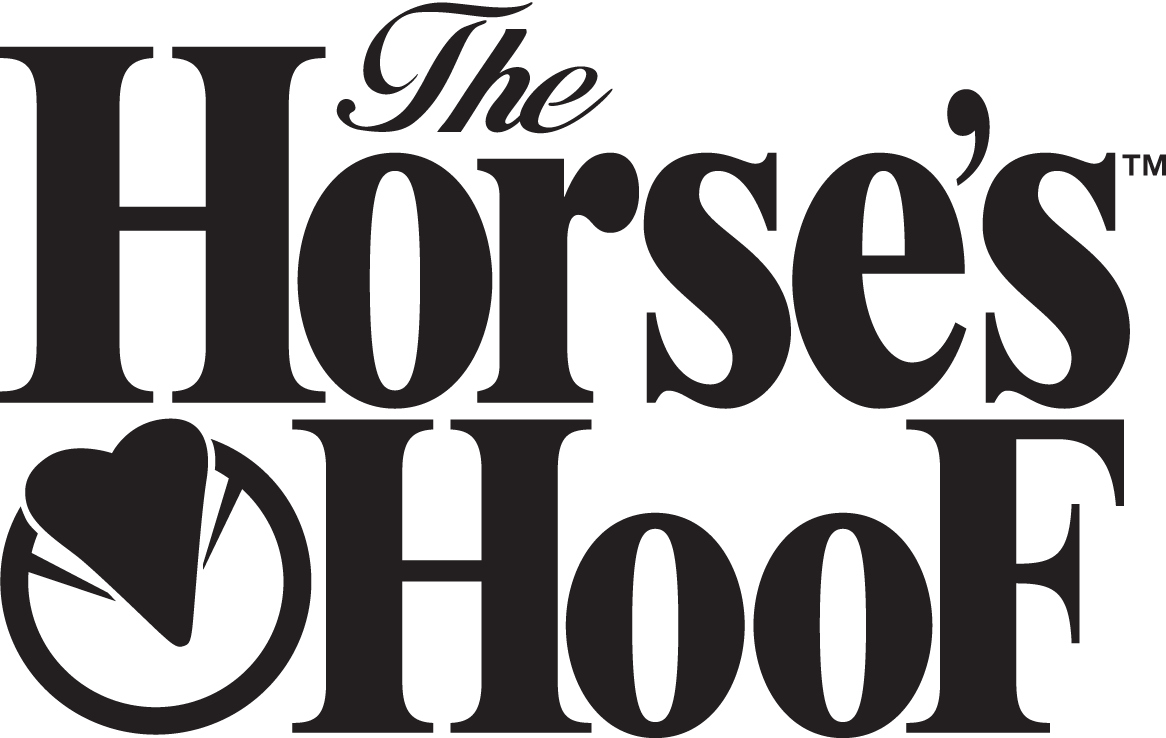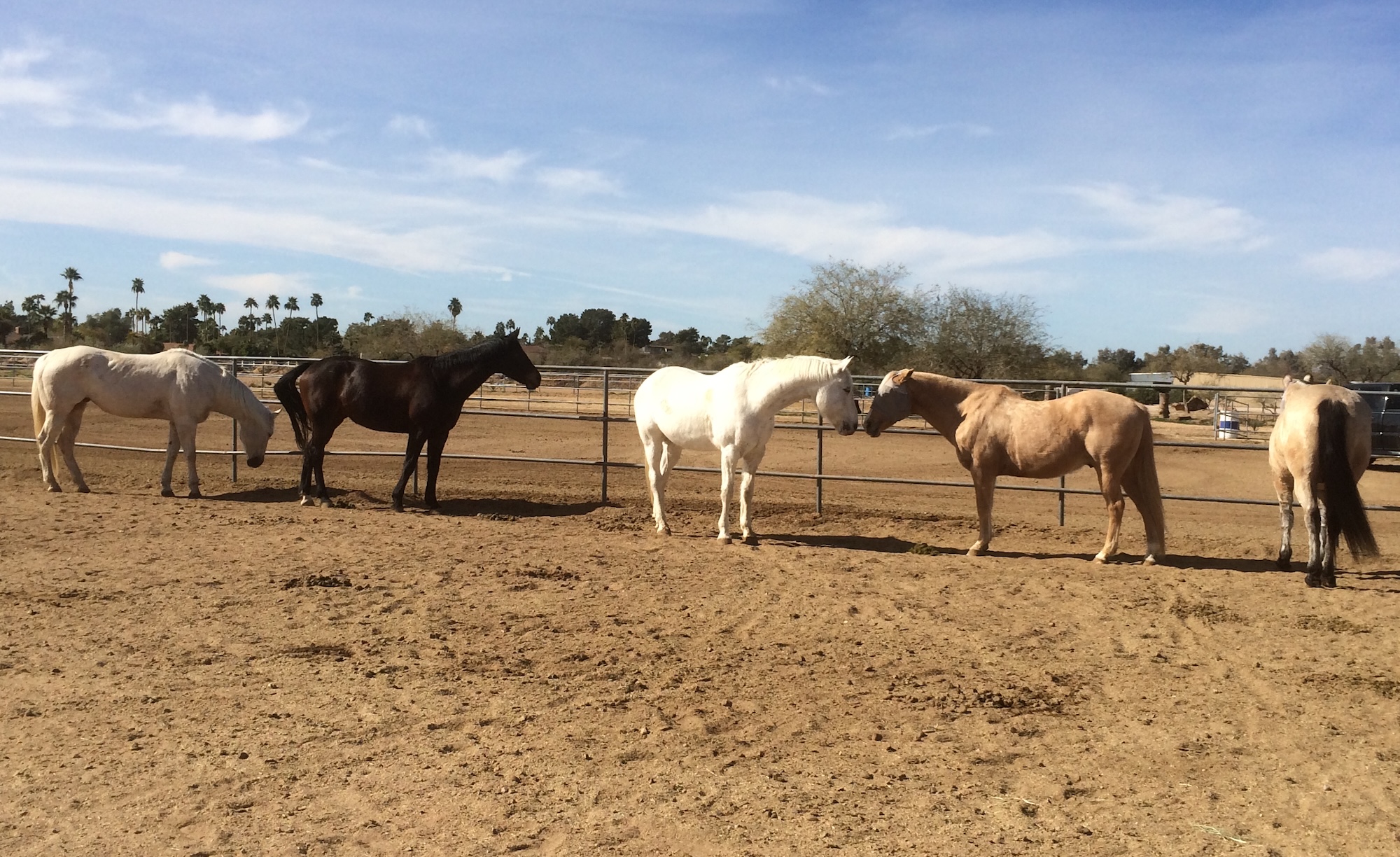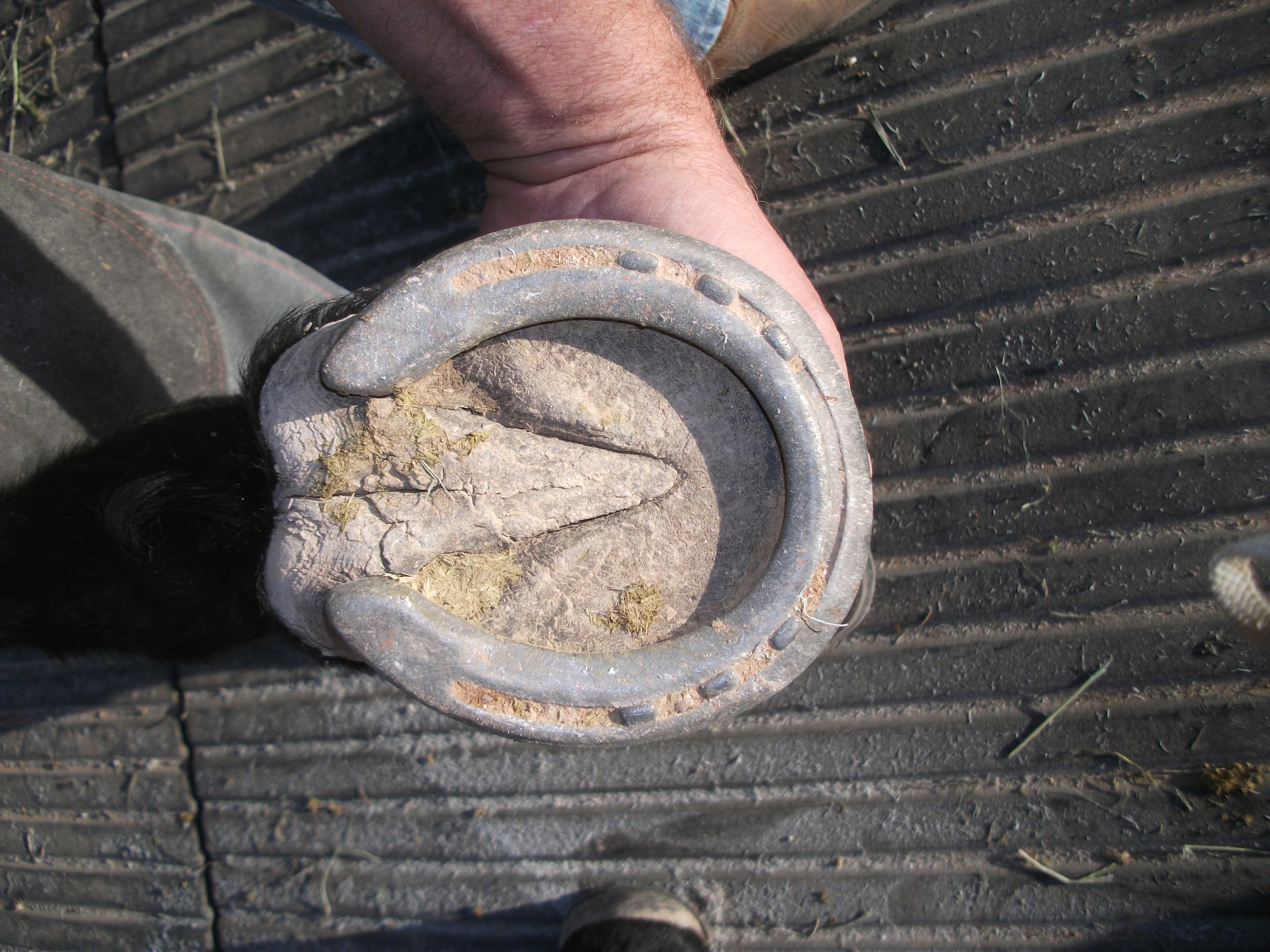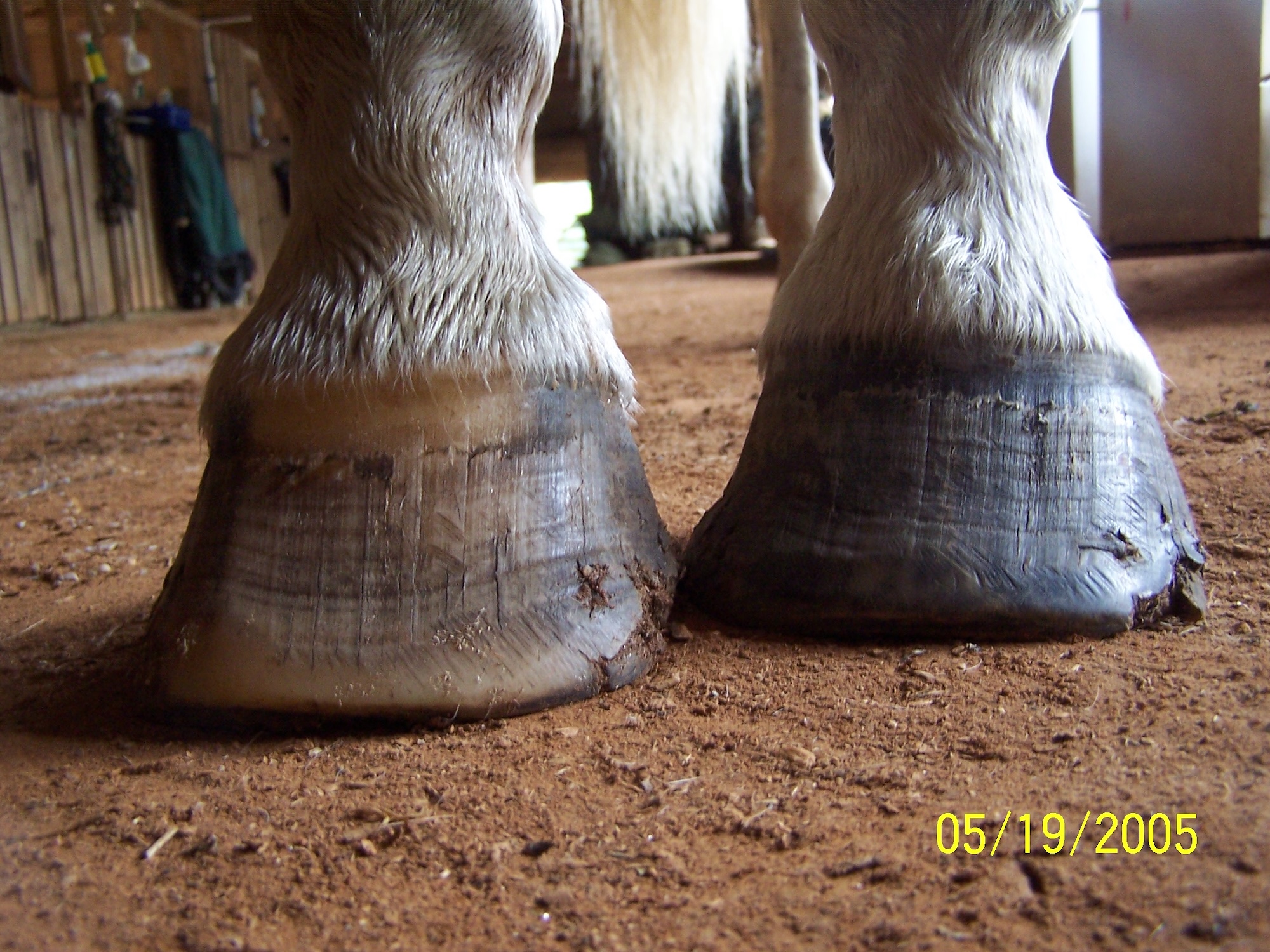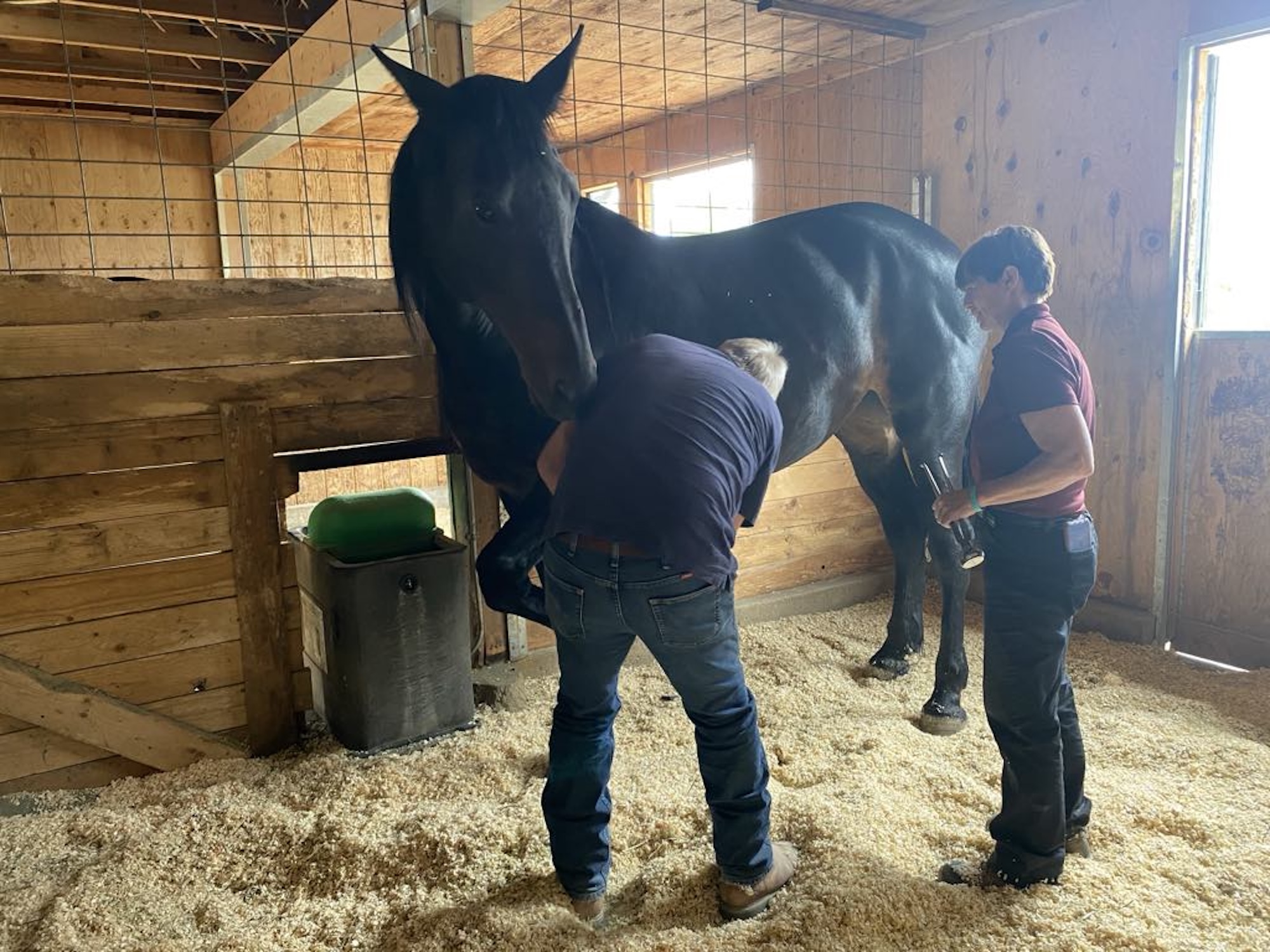Natural horse living conditions are necessary! Perhaps my greatest dream is that, in the not-so-distant future, there is no more “Turn Out” for horses – that the entire practice is completely discontinued and viewed as the damaging, negative situation that it truly is.
What?!! Does this sound shocking? Of course, what I specifically mean is that horses should LIVE OUT all the time. There should be no more “Turn Out.” Horses should live out, and be taken in for very brief periods as needed for specific reasons (“Turn In” for half an hour!), then be put back OUT to live their lives, outdoors, in their herd, as they deserve to live. That is the right way, the healthy way, the best way to keep horses. ALL horses.
Yes, you can provide them with shelter, and even cozy bedded stalls, but keep all the doors wide open and allow free choice for everything. Don’t ever force confinement – and particularly NO isolation – if there is any alternative. Movement and herdlife – living in a group of other equines – are the basis of sound, healthy, long lives in captivity. Natural barefoot horsekeeping protocol has long emphasized freedom of movement, but equal attention needs to be paid to the concept of the herd.

Even the most beautiful, spacious stall coupled with hours of solitary turn out time will NEVER provide a horse with what he truly needs to be healthy. The most valuable horses tend to be the ones most lacking.
Let’s look at “Turn Out” from the horse’s perspective. Here are a couple of imaginary scenarios (and let’s just say that all of these horses are barefoot, and kept by loving owners who believe they are doing the very best for their horses):
1) The Show Horse. This Warmblood gelding is a winning show horse, highly valuable, and therefore the owner is following the protocol of traditional horse-keeping. This horse is kept in a spacious box stall with attached outside run (so he can view other horses), but he has no physical contact with other horses at any time (too “dangerous”). Every day he is led to a small paddock for an hour or two of solitary turn out. During turn out, he runs around and acts quite distressed. The owner is told that her horse “doesn’t like turn out.” Not surprisingly, the horse is later diagnosed with ulcers, despite being free-fed hay.
From the horse’s point of view: He is living an extremely unnatural lifestyle, forced to accept confinement, which began at an early age (due to his “value”). The lack of physical contact with other equines creates a constant state of stress in his life. His insecurity increases when he is taken to the paddock and set free – alone. This creates even greater stress, and his response is to want to return to the “security” of his familiar stall (even though it is a prison). All of this is abnormal behavior created by unnatural living conditions. This horse does not “dislike” turn out; this horse is suffering from confinement and lack of equine contact! Change his living conditions, give him a herd, and he will be a new, improved horse. Certainly the most “valuable” horses deserve the very best care – and that means living out in a herd.
2) The Boarded Horse. This Quarter Horse gelding is boarded at a rare barn where horses are turned out into a group pasture for 8 hours at a time. The rest of the day, each horse lives in an individual covered pen with adjacent neighbors. This horse is turned out into the “gelding pasture” for his turnout period, and the horses tend to vary. Unfortunately, he begins fighting, and things only get worse. Now he is laid up with a severe injury, and so the prescription is “stall rest.”
From the horse’s point of view: He lives with constantly changing neighbors, and pasture-mates. This highly unstable situation is not exactly natural – at least not without the fighting that usually accompanies such changes! Horses live in a delicate hierarchy, and this order and structure is redefined with each new herd member. This gelding views his neighbors as one herd, and his pasture-mates as another herd, and neither provide stability. The best solution for the horses is to discontinue “turn out,” and let the horses live in the pasture together, 24/7, in a stable herd. Helpful for boarding? Not exactly. But this is the horse’s point of view; it’s not supposed to be what’s best for the human… As a compromise, the owner would need to either move the horse to a better situation, or work with the boarding stables to at least create a more permanent and amicable group for the gelding’s turnout.
3) The Backyard Horse. This Paint gelding lives in the typical tiny backyard “mini-ranchette” that is popular in the suburban Southwest. There is a block wall fence around the 2 acre property, and the gelding lives alone in a 16 ft x 30 ft pipe pen corral with shelter. He is turned out all day in a 1/2 acre irrigated pasture right next to his pen. He can hear, but not see, horses on the other side of the block wall fence. His owner takes him out on local weekend trail rides, and he’s now becoming extremely spooky on the trail. In addition, he has started to drop weight, even though the owner has increased his feed. Finally, he starts having mild colic episodes.
From the horse’s point of view: This gelding lives in a state of high stress. He has no herd at all; only distant horses that he can’t even see, much less touch. Every instinct tells him that his life is in grave danger unless he finds the companionship of one or more equines. The mental and emotional stress are taking their toll, and this lead to a physical breakdown. His digestion system is immediately affected, leading to weight loss and colic. The solution is quite simple: the owner needs to give this horse another horse! A pony, mini horse, or even a donkey will suffice, but usually horses prefer other horses similar to them in size and stature (herds of equals!). A gelding can be compatible with either a mare or another gelding. Introduction will need to be slow and gradual (supervised, at first), but ALL horses starved for company will quickly accept a new horse.
Ideally, the owner will create a NEW paddock arrangement (perhaps a paddock paradise?) to allow the 2 horses to live out, free roaming, 24 hours per day, for the health of their mind, body and hooves. This change will solve the gelding’s stress and digestive crisis, and will greatly lengthen his life.

Living OUT all the time should become the NORMAL way to keep all horses. Turn In as needed for short periods – but abolish the concept of Turn Out.
The more naturally-minded horsekeepers began exploring the benefits of herd-keeping long ago, but now science is backing us up on the importance of herdlife. Noted equine behavior scientist and trainer Dr. Andrew McLean describes the importance of physical touch in the equine, “The horse has the biggest amygdala (the part of the brain that modulates fear) of all domestic animals yet on the other hand his heart rate is significantly lowered when groomed by other horses at the base of the neck.” The horse is a very social creature, and we CANNOT underestimate the importance of touch between horses!
McLean continues: “For horses there are important health benefits in being able to allogroom (stroke/scratch each other). Group-housed horses for example show significantly lower incidences of stereotypies (stress related issues such as cribbing, weaving etc.). As an antidote for fear and insecurity, it seems this is a really important site of attachment and bonding.”
Starving your horse of physical contact with other equines will create stress, leading to behavioral and physical problems. The greatest gift we can give any horse is another horse. And those horses need to live out, all the time, as their normal, correct, healthy lifestyle.
Reference: http://www.horsemagazine.com/thm/2013/12/andrew-mclean-on-attachment-theory/
by Yvonne Welz, published 2017 Hoof Help Online
See the full content listing of all issues of The Horse’s Hoof Magazine! We also provide instructions on how to read the issues for free on Hoof Help Online.
For a detailed listing of all articles on The Horse’s Hoof website, please visit our Article Directory.
